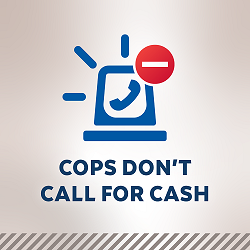 On August 30, 2021, Sheriff Hutchinson announced a new program dedicated to fighting a common type of phone scam: individuals posing as law enforcement agencies and demanding payment for a missed court date, jury duty, or other legal matter. The new program is called “Cops Don’t Call for Cash” and is focused on educating the public on the fact that law enforcement agencies will never contact individuals via phone or email to ask for any kind of payment.
On August 30, 2021, Sheriff Hutchinson announced a new program dedicated to fighting a common type of phone scam: individuals posing as law enforcement agencies and demanding payment for a missed court date, jury duty, or other legal matter. The new program is called “Cops Don’t Call for Cash” and is focused on educating the public on the fact that law enforcement agencies will never contact individuals via phone or email to ask for any kind of payment.
“For years, criminals have been posing as law enforcement and demanding payment for some non-existent legal issue,” said Sheriff David Hutchinson. “These scams are often quite sophisticated and are designed to make people feel panicked. Fortunately, this is one of those issues for which education is really the answer. That’s why we gave this program the title Cops Don’t Call for Cash. Simply remember the name and you’ll be able instantly spot a phone scam.”
In these types of phone scams, criminals tell the recipient that there is a warrant out for their arrest because they missed a federal court appearance and are in contempt. The phone scammers tell residents that they will be arrested unless they pay a fine. The scammers often encourage residents to purchase prepaid money transfer cards, such as MoneyPak, call the scammer back, and read them the numbers on the cards. These scammers often have technology to make it appear that they are calling from a legitimate law enforcement agency phone number.
The Cops Don’t Call for Cash Campaign aims to eliminate this type of phone scam through a robust, multi-agency awareness campaign, led by the Hennepin County Sheriff’s Office.
Law enforcement agencies will only contact individuals who owe a monetary fine via mail and will never contact individuals via phone or email to ask for any kind of payment. If individuals receive such a call, they should remember the phrase “Cops Don’t Call for Cash,” refuse to provide any personal information or make any payments to the caller.
Anyone who believes they have been victimized by a scam caller should record the caller’s number, save any voicemails that may have been left by the caller, and contact their local law enforcement agency.
Individuals should not rely on caller ID or recorded messages to verify the origin of a phone call. In some cases, phone scammers can use technology to appear as if they are calling from a legitimate law enforcement or government agency number. Scammers have also been known to create fraudulent recorded messages that identify their number as originating from law enforcement.
If you are uncertain about the identity of a caller, hang up the phone, locate the official phone number of the agency, and call the number directly.